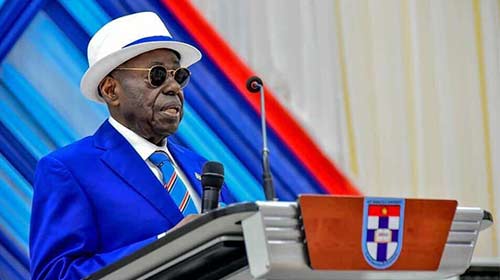909
By Oscar Okhifo
Legal luminary and founder of Afe Babalola University, Ado-Ekiti (ABUAD), Aare Afe Babalola, has expressed deep concern over Nigeria’s growing public debt, warning that the nation’s borrowing trend is scaring away foreign investors and threatening its economic stability.
Babalola, who spoke on Saturday, during the 2025 International Leadership Conference held at ABUAD, lamented that Nigeria’s total public debt had ballooned to N152.4 trillion (about $99.7 billion), describing the situation as alarming and unsustainable.
He noted that the country’s mounting indebtedness has made it unattractive to international investors, adding that “business companies from other countries do not want to invest in this debtor country.”
According to him, several banks have begun to complain that the Central Bank of Nigeria (CBN) could no longer honour government promissory notes due to the country’s rising debt obligations.
He said, the development was a reflection of the fiscal distress facing the nation.
“The banks are saying the CBN cannot honour government promissory notes because the Federal Government owes too much. This is not the kind of image that encourages investors to come in,” he stated.
The legal icon warned that Nigeria’s growing debt burden could worsen unemployment, poverty and insecurity if urgent steps were not taken to reverse the trend.
He urged the government to adopt more prudent fiscal management practices and channel borrowed funds into productive ventures that can generate returns and boost revenue.
Babalola, who described the theme of the conference “Shaping Transformational Leaders: Tackling Insecurity, Governance and Development” as timely, said leadership at all levels must demonstrate transparency and discipline to save the economy from collapse.
He also called on policymakers to reduce recurrent expenditure, diversify the economy and improve tax collection efficiency to reduce reliance on borrowing.
“Nigeria must rethink its debt strategy and rebuild investor confidence,” he added.
“A nation cannot develop on borrowed money alone. We must learn to live within our means.”
Babalola is not the only prominent voice raising concerns about Nigeria’s rising debt. A few months ago, the Speaker of the House of Representatives, Tajudeen Abbas, had also expressed similar fears at a public function, warning that the debt situation could undermine the country’s economic future. However, he later claimed he was misquoted.
The issue has continued to generate questions from citizens, who wonder why the government’s borrowing continues to soar despite assurances that the removal of petrol subsidy would free up more funds for development. Many Nigerians are asking why the nation’s debt profile is ballooning rather than shrinking, even as the administration insists that more money is now available for distribution among the tiers of government.
Economists say the development raises questions about fiscal transparency and the effectiveness of government spending, particularly as debt servicing continues to consume a significant portion of national revenue.
Babalola’s warning, coming at a time of rising public unease over Nigeria’s debt trajectory, underscores the need for urgent policy reforms to restore financial stability and investor confidence.



